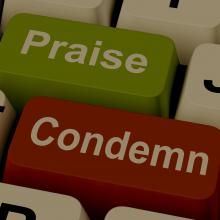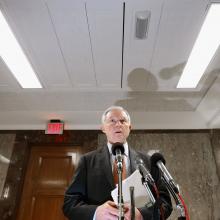responsibility
PHILIP JENKINS’ REMARKABLE Climate, Catastrophe, and Faith: How Changes in Climate Drive Religious Upheaval leads off with Voltaire: “Three things exercise a constant influence over the minds of [humankind] — climate, government, and religion ... That is the only way of explaining the enigma of this world.”
Climate and geology are now the new prisms for our shared discernment of how we are to live in our own time and place as followers of Christ. We’re driven to centering climate because we can no longer live with the expectation of the balanced climate of the last 12,000 years, the geologic epoch called the late Holocene. We are now in a new geologic epoch: the Age of the Human, or the Anthropocene.
Anthropocene reality leaves Christian ethics nowhere to hide. Nowhere to hide because unprecedented cumulative human powers doubled down on planet-spanning changes that launched the first geological epoch created by human choice and action. The fact that human choice and action has done this means that everything, including extinction, turns on ethics. As Christians, we can look away and abdicate our responsibility, but we cannot escape the massive human presence that lines out our lives — and all life. We’ve become totalizing creatures. We humans are, for the first time, both ark and flood.
This extraordinary power has been recognized for a while. In 1944, Dietrich Bonhoeffer wrote that the unprecedented powers of modern science and technology led to a world in which “it all comes down to the human being,” a world where “everything turns upon humanity.” He thus set out to reconceive human responsibility for a world that had come of age. For Bonhoeffer, “world come of age” was not a statement of moral maturity. It was a statement of moral accountability. People who legally come of age at 18 or 21 are accountable, whether they exercise their agency maturely or not. When everything turns on humanity, Bonhoeffer said, the whole human world has arrived at that point of accountability.
A current term for human powers and their collective impact is “assisted evolution.” But the phrase is deceptive because it hides the depth, breadth, and temporal reach of those powers. Does the phrase “assisted evolution” reveal that the carbon people produce has the ability to alter marine chemistry, flood coastlines, strip glaciers “to bare bones,” embolden deserts, warp the circulation of ocean currents, “supercharge extreme weather events,” and rearrange “the distribution of animal, plant, and microbial species across the globe,” as author David Farrier puts it? This isn’t evolution “assisted”; it’s evolution hacked and hijacked.
Wrestling with the complicated legacy of Christians and international adoption.

Image via Stuart Miles/Shutterstock
Many countries in the global community do not have the right to free speech. In the U.S., our right to speak out is protected under the Constitution. How well do we live up to the responsibility granted with that freedom?
The Epistle of James is written to urge Christians to practice the ethic of Israel’s covenantal, prophetic tradition. In this particular text, the apostle reflects on the enormous power of speech and the potential of the tongue for doing good or evil. Appeal to the covenantal, prophetic tradition of Israel may suggest two connections for us. First, the covenantal commandments of Sinai, the Ten Commandments, already have in their purview the cruciality of "right speech" — the ninth commandment prohibits "false witness."
The original reference concerns testimony in court. In larger horizon, however, the commandment pertains to the neighbor.
To my fellow men,
I’m sure you are as heartbroken as I am about the killings at UC Santa Barbara by a troubled young man with a misogynistic manifesto. Heartbroken for the community, for the families who lost loved ones, and even for the young man who felt like there was no other way.
Now I’m not much of a “Tweeter” (is that the right word?), but I heard that a group of us has taken to defending ourselves on Twitter with the hashtag #NotAllMen. They want to say that that #NotAllMen sexually assault women. #NotAllMen expect a date to be reciprocated with sex. #NotAllMen harass women for the way they do or don’t look at us. They want to say that we’re not like those other people, that we respect women as equals, not demean them as prizes or products.
Who cares?
We have a responsibility to use the Earth's wealth relationally, not exploitatively.
THE MOST common image of the assassination of President Kennedy is embedded in the collective consciousness due to the fact that it was the subject of what may be the most-seen film in history, Abraham Zapruder’s 26-second home movie, grainy and garish in color and fact. The more recent eruption of reality television may have left us nearly unshockable, but a long, hard look at Zapruder’s short, hard film is still horrifying. The most provocative context in which I’ve seen the film located is Stephen Sondheim’s meaty musical Assassins. The Broadway production had Neil Patrick Harris as Lee Harvey Oswald with the film projected onto his white T-shirt. That the show took place at Studio 54 served to underline the demonic bargain at the intersection of the military-industrial-circus complex: The nightclub theater location satirized the fact that our stories about killing can either critique the cultural appetite for destruction or serve to perpetuate more of it as a form of entertainment.
If Assassins was the most provocative screen for the Zapruder film, the most politically complex is Oliver Stone’s 1991 movie JFK, now being rereleased to mark the assassination anniversary. It’s one of the greatest examples of cinematic craft applied to polemic (current examples are Captain Phillips and 12 Years a Slave)—edited like a dance, with a television miniseries’ worth of big name actors (Jack Lemmon, Sissy Spacek, Walter Matthau, Donald Sutherland, John Candy) in small roles holding up the edifice of big speechifying done by Kevin Costner and Tommy Lee Jones. It’s a thrilling film, and it has intellectual substance—the point is not whether or not the conspiracy theory posited in JFK is true, but that human beings “sin by silence” when we should speak.
It was a strange, but telling, spectacle when those who billed the government millions for working on its Affordable Health Care registration system denied any accountability for the portal’s astounding failure.
“The other guy did it,” as they say in court. The client kept changing specs, no one did any whole-system testing, other vendors are to blame — blah, blah, blah.
Whatever shred of truth lay in their blame-shifting ran up against another wall of non-accountability. The Republicans did it with their insane sequestration, said Democrats. The Democrats did it, said the GOP. Health and Human Services did it. The Oval Office did it.
In the end, of course, no one will accept accountability, for we live in an age when the “buck” never stops on one’s own desk, if it stops at all.
The momentum for immigration reform is building across the country, but leaders in Washington are often the last to realize the seismic shifts taking place. The most recent example is when Alabama Sen. Jeff Sessions made the claim that there is no “moral or legal responsibility to reward somebody who entered the country [without documentation].”
No moral responsibility? Many Christians believe otherwise.
The tragedy of the Steubenville rape case has provided a moral challenge to our nation. We are caught up in a highly emotional cycle of blame as we debate who the real victim is in this case. I find myself asking two questions: Why is our nation obsessed with the story and what does this story mean for us as individuals and as a culture?
My Family
I’ve always wanted a daughter. The problem is that adult Ericksen dudes tend to produce baby Ericksen dudes. My dad has 4 siblings — all brothers. I have mostly male cousins. So, when my wife and I started having children … yep … two dudes.
My Church Family
I’ve been a youth pastor for about six years, and for a long time I thought the closest I’d ever get to having a daughter was to pseudo-adopt the girls in my youth group. Actually, they first pseudo-adopted me by claiming me as their “Father” on Facebook. (Hey, it’s on Facebook, so my pseudo-fatherhood status is legit.) As something of father figure for these teenage girls, each youth group session I discussed with young women and men how the Christian faith is leading us into patterns of love and non-violence. Frequently after our sessions, one of my pseudo-daughters will tell me she’s dating a boy. So, of course, after teaching them about non-violence, I say to each of them with a straight face:
If he ever touches you, I will personally kick his ass.
I DON'T OWN any guns, and I've only fired them at inanimate objects, but I live in the country, so guns are a part of my life.
During deer season, the woods around our place sometimes sound like Baghdad circa 2006. We used to have a close neighbor who regularly fired a gun in his backyard, usually on Sunday afternoons—at what, we're not entirely sure. Our family has a three-legged dog that lost his right rear appendage to a gunshot wound. Our kids in Boy Scouts get gun safety training and rifle and shotgun shooting lessons in a program certified by the National Rifle Association.
So when the gun control debate heats up, as it has since the Sandy Hook School massacre, I come down with a serious case of mixed feelings. I think rural gun lovers are at least partly right when they say that urban gun control advocates look down on them as ignorant primitives. Many city people, and I'd dare say most urban liberals, don't understand the rural culture of hunting and shooting and can't be bothered to expend the moral energy that act of empathy would require. For me, that part of the gun control discussion pushes the same outrage buttons that go off when an economist says people in dying rural communities just need to move, or when someone else suggests eliminating all farm subsidies from the federal budget. Such comments betray the fact that the speakers neither know, nor care, about rural communities and rural culture.
On the other hand, fear of outsiders is also a part of rural culture. Groups like the NRA, and gun manufacturers themselves, have done a pretty good job of exploiting that flaw, to the point that some of my neighbors are convinced that they need assault weapons to defend themselves against some vague, unnamable "them." And my experience of rural life, which has all been in the South, confirms that this can apply doubly or triply to "outsiders" with a different skin color.
“Sticks and stones can break my bones, but words can never hurt me.”
How many of us grew up with this old adage ringing in our ears? How many of us believe it’s true?
I’ve gone back and forth over the years. I understand that the saying is an invitation to turn our backs on harsh, mean-spirited words thus robbing them of their power, but how many of us are really capable of simply doing that? The truth is words do hurt and sometimes they do more than hurt. Sometimes they are downright destructive and on a large scale.
I think this is what the writer of James is getting at in this morning’s text. Words, the works of our tongues, can be used for good and evil. It is not always easy for us to shape our words and move our tongues in a fashion that serves our faith, our calling as Christians, our work for the reign of God on earth.
One important spiritual discipline, one vital element to our faith formation, then, is learning to tame the tongue. That is, we are challenged to develop custody of our speech in such a way that good news is proclaimed and people are lifted up toward the fulfillment of their creation in the image and likeness of God. Remember, James is especially concerned that we align our words and our work so we both “talk the walk” and “walk the talk.”
If we are offspring of the heavenly parent, if we are made in the likeness of God, how should that shape our speech and control the way we wag our tongues?
Growing up I shadowed my father to a great deal of community and board meetings, public hearings, and church events. By the time I was 2 years old, my father had already been elected to represent a working-class district of East Baltimore City. The example of public service and the principles of stewardship and goodwill that my father carries became some of the most important things that contributed to the way I view our world and the way I treat our people.








